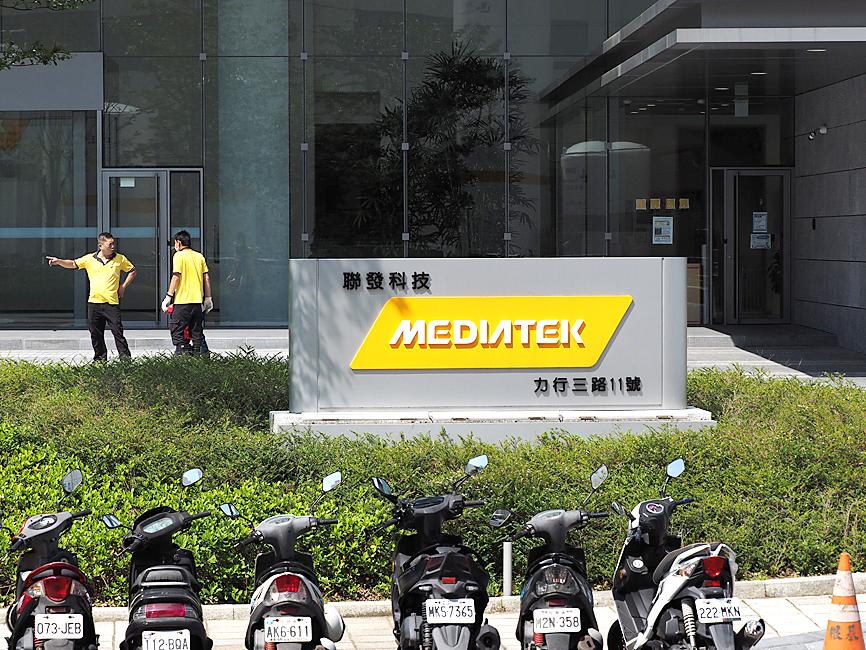Handset chip designer MediaTek Inc (聯發科) plans to fully acquire broadband chip supplier IC Plus Corp (九暘電子) for NT$1.51 billion (US$52.94 million) through one of its subsidiaries, the company said on Sunday.
Airoha Technology Corp (絡達科技), a MediaTek subsidiary, has offered to buy all 68.55 million shares of IC Plus at NT$22 per share, MediaTek said in a regulatory filing.
The figure represents a 15.8 percent premium on IC Plus’ closing price of NT$19 on Friday.

Photo: David Chang, EPA-EFE
IC Plus yesterday rose by the daily limit of 10 percent to NT$20.9 on the Taipei Exchange.
The deal “will help the company develop broadband communications chips and related products, and enhance the company’s competitiveness. The transaction will have a positive impact on the company’s business,” MediaTek said in the filing.
IC Plus, which makes chips used primarily in Ethernet transceivers or switches, would see its shares delisted from the exchange upon the completion of the transaction.
The deal is subject to the approval of shareholders at an extraordinary meeting on Feb. 23.
IC Plus swung into a loss of NT$997 million in the first three quarters of this year, compared with a net profit of NT$157 million in the same period last year.
That translated into losses per share of NT$1.48 in the first three quarters, compared with earnings per share of NT$2.34 a year earlier.
This is the third acquisition launched by MediaTek this year.
Two weeks ago, the company announced plans to acquire a 20 percent stake, or 12.4 million shares, in Asix Electronics Corp (亞信電子) at NT$40 per share through a private placement.
Asix specializes in supplying chips used in high-speed Internet cards.

UNCERTAINTY: Innolux activated a stringent supply chain management mechanism, as it did during the COVID-19 pandemic, to ensure optimal inventory levels for customers Flat-panel display makers AUO Corp (友達) and Innolux Corp (群創) yesterday said that about 12 to 20 percent of their display business is at risk of potential US tariffs and that they would relocate production or shipment destinations to mitigate the levies’ effects. US tariffs would have a direct impact of US$200 million on AUO’s revenue, company chairman Paul Peng (彭雙浪) told reporters on the sidelines of the Touch Taiwan trade show in Taipei yesterday. That would make up about 12 percent of the company’s overall revenue. To cope with the tariff uncertainty, AUO plans to allocate its production to manufacturing facilities in

TAKING STOCK: A Taiwanese cookware firm in Vietnam urged customers to assess inventory or place orders early so shipments can reach the US while tariffs are paused Taiwanese businesses in Vietnam are exploring alternatives after the White House imposed a 46 percent import duty on Vietnamese goods, following US President Donald Trump’s announcement of “reciprocal” tariffs on the US’ trading partners. Lo Shih-liang (羅世良), chairman of Brico Industry Co (裕茂工業), a Taiwanese company that manufactures cast iron cookware and stove components in Vietnam, said that more than 40 percent of his business was tied to the US market, describing the constant US policy shifts as an emotional roller coaster. “I work during the day and stay up all night watching the news. I’ve been following US news until 3am

Taiwan will prioritize the development of silicon photonics by taking advantage of its strength in the semiconductor industry to build another shield to protect the local economy, National Development Council (NDC) Minister Paul Liu (劉鏡清) said yesterday. Speaking at a meeting of the legislature’s Economics Committee, Liu said Taiwan already has the artificial intelligence (AI) industry as a shield, after the semiconductor industry, to safeguard the country, and is looking at new unique fields to build more economic shields. While Taiwan will further strengthen its existing shields, over the longer term, the country is determined to focus on such potential segments as

COLLABORATION: Given Taiwan’s key position in global supply chains, the US firm is discussing strategies with local partners and clients to deal with global uncertainties Advanced Micro Devices Inc (AMD) yesterday said it is meeting with local ecosystem partners, including Taiwan Semiconductor Manufacturing Co (TSMC, 台積電), to discuss strategies, including long-term manufacturing, to navigate uncertainties such as US tariffs, as Taiwan occupies an important position in global supply chains. AMD chief executive officer Lisa Su (蘇姿丰) told reporters that Taiwan is an important part of the chip designer’s ecosystem and she is discussing with partners and customers in Taiwan to forge strong collaborations on different areas during this critical period. AMD has just become the first artificial-intelligence (AI) server chip customer of TSMC to utilize its advanced